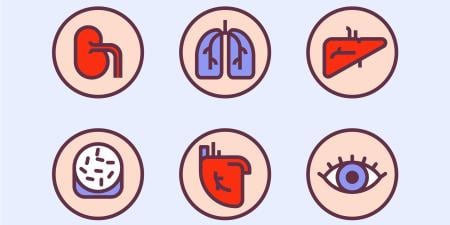Case
Jenny is a third-year medical student on her internal medicine rotation at the Veterans Administration Hospital. The rotation has been a great learning experience; her patients are generally friendly and grateful for the care they are receiving.
One of Jenny's favorite patients is Mr. Hackman, a 53-year-old veteran who has been diagnosed with alcoholic cirrhosis and is currently on the transplant waiting list. Every afternoon Jenny talks with Mr. Hackman, and he often shares stories with her about the past. Jenny takes a genuine interest in the stories about his family and supports his attempts at sobriety. During one of their sessions, Mr. Hackman revealed that he had taken a drink at a friend's house 2 months prior. He swore that this was "the only drink I've had in the last 2 years." He pleaded with Jenny not to tell anyone about his transgression because he knew that alcohol abuse could affect his status on the transplant list.
Commentary 2
Jenny is facing what seems to be a difficult moral dilemma. On the one hand, she is duty-bound to act as an advocate for Mr. Hackman, making sure he receives the best possible medical treatment. In this case, that means she must help ensure that Mr. Hackman receives a new liver. On the other hand, she is obligated to be a responsible steward of scarce, life-saving medical resources. If she honestly believes that Mr. Hackman will not benefit from access to a donated cadaver liver or lobe of a liver obtained from a living donor, or that there are others who would be better beneficiaries, then she must inform the medical team about her concerns regarding Mr. Hackman's alcohol use.
This looks like a genuine professional dilemma. But it may not be. Doing what seems the difficult thing—"snitching" on her patient—may turn out to be the best thing she can do to help him secure the treatment he needs.
What might lead Jenny to believe that her desire to help Mr. Hackman must yield to her duty to be a responsible health team member, stewarding the limited supply of livers available for transplant, is Mr. Hackman's "confession" that he has had a drink. In many liver transplant programs and perhaps at Jenny's institution, a period of sobriety, usually 6 months, is an absolute requirement for transplant eligibility. Still, despite the fact that Mr. Hackman seems to have put himself at a severe disadvantage in the competition to secure a liver, certain facts may make it easier for Jenny to decide how to discharge her conflicting ethical duties.
Having a single drink, sometimes referred to as a "slip" in alcohol abuse programs, is not uncommon. Many people on the road to sobriety slip, as the literature on the treatment of alcoholism quickly reveals.1 Moreover, views and attitudes about sobriety and alcoholism that prevail among health care professionals are not consistent with what those experienced in the field of drug and alcohol abuse consider efficacious treatment.2 A single drink is not the end of the line as far as sustained sobriety after a liver transplant goes.
Presumably Jenny can share the information she has about Mr. Hackman with a member of the transplant team who is well informed about alcohol abuse and recovery. It is difficult to imagine that a psychiatrist, psychologist, or social worker affiliated with a liver transplant team would be overly concerned about a report of a single instance of taking a drink on the part of someone on a waiting list.
Jenny can and should tell Mr. Hackman she is going to suggest that a more experienced person talk with him about his slip. She can also assure Mr. Hackman that a single drink, if that is all that has happened, is not going to lead directly to his being dropped from the transplant list or even weaken his priority in gaining access to a liver.
It may also be of interest to Jenny to know that there is not a lot of data to support the view that a history of alcohol abuse adversely effects the success of liver transplantation. Nor is there much evidence that periods of sobriety—by themselves—are key to the success of liver transplantation. Having a strong social support network has been shown to be the most important factor in achieving success among alcoholics who receive liver transplantation.3 Mr. Hackman has made it clear that he has strong support from friends and family alike. These facts make his chances for doing well with a new liver better than average.
Although Mr. Hackman did not tell Jenny about his slip in confidence, he later asked her not to say anything. But any factor that bears on his chances of successfully surviving and flourishing with a liver transplant must be addressed. To act ethically, Jenny must tell Mr. Hackman that this is so. Then she needs to inform an appropriate member of the transplant team.
Jenny must also tell Mr. Hackman that a single slip is not at all uncommon, that the transplant team will be familiar with this situation, and that one slip should not adversely affect his chances of receiving a transplant. In fact, his willingness to talk about this incident with his doctors and his family shows that he is precisely the sort of candidate that is likely to do well after a surgery. Admitting his mistake with a renewed commitment to sobriety may be just what the transplant team is looking for in prospective patients.
References
- Sobell LC, Sobell MB, Connors GJ, Agrawal S. Assessing drinking outcomes in alcohol treatment efficacy studies: selecting a yardstick of success. Alcohol Clin Exp Res. 2003;27(10):1661-1666.
-
Roche AM, Parle MD, Stubbs JM, Hall W, Saunders JB. Management and treatment efficacy of drug and alcohol problems: what do doctors believe? Addiction. 1995;90(10):1357-1366.
- Karman JF, Sileri P, Kamuda D, et al. Risk factors for failure to meet listing requirements in liver transplant candidates with alcoholic cirrhosis. Transplantation. 2001;71(9):1210-1213.



